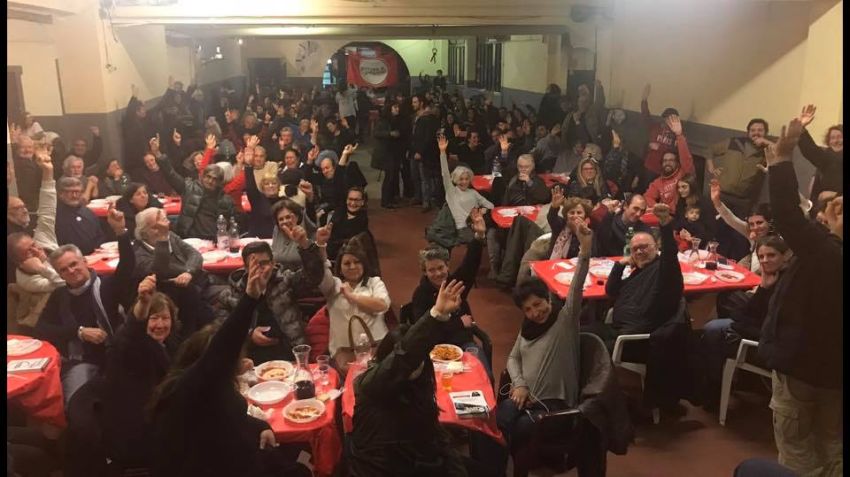
Italian general elections on March 4 will be a testing ground for the new grassroots, left-wing movement Potere al Popolo (Power to the People), born only four months ago.
In a climate of hatred that has poisoned the electoral campaign, Power to the People has stood out for its scale of popular participation, both in the way it established its political agenda and in the campaign itself. In this sense, Power to the People is an unprecedented attempt at creating a real bottom-up democratic movement.
Led by the young activist Viola Carofalo, the new group is aiming at giving political weight back to unemployed and precarious workers, women, students, pensioners and all the weaker members of society.
Indeed, the political class that has governed Italy for the past 25 years is only representative of itself and the interests of a very restricted minority of rich people. It is no coincidence, then, that in the most recent period unemployment and poverty have dramatically increased and that workers have been progressively deprived of their rights and dignity.
That is the main reason why Power to the People’s main source of inspiration is the Italian Constitution, born from the resistance against fascism and enacted out of that resistance in 1947. For instance, the first article of the Italian Constitution says, “Italy is a democratic Republic founded on Labour”. This means that everyone has the right to have a proper job, with a decent pay that allows them to live freely and with dignity.
With this behind it, Power to the People aims at abolishing the latest labour reform (the so-called “Jobs act”), which has drastically cut workers’ rights for the benefit of corporations. For instance, workers are not protected anymore in the event of redundancy and have had a significant pay cut on a national scale.
To solve this problem, Power to the People proposes to cut working hours, raise wages and fully restore all workers’ rights.
With its latest education reform, the government has introduced the obligation for high school students to take on unpaid internships. The government thinks that this will be useful to “get students ready for the job market”, but this is just exploitation of free labour and a form of modern slavery.
Power to the People wants to abolish this reform too, and invest more money in creating a public, free and accessible education system, at all levels.
The same applies for health care, which has been affected by large-scale privatisation that that has led to a worsening of services and rising charges. Power to the People intends to make healthcare completely public and accessible to everyone, kicking out all the private interests from the healthcare system.
Moreover, Power to the People proposes a huge investment in public housing, as well as progressive taxation, so that rich people pay more taxes and less wealthy people could contribute according to their economic situation. This measure could cut the enormous gap between rich and poor. Today, the richest 1% of Italians own 25% of national wealth.
Power to the People’s position is also clear when it comes to immigration, a critical issue in this election. It proposes to improve the management of migration flows by promoting a fairer and publicly managed reception system, able to guarantee basic human rights to migrants, refugees and asylum seekers.
It firmly rejects current European regulations, as well as the latest immigration law, as they are very restrictive and scapegoat immigrants and refugees.
Civil rights are also a crucial point. Power to the People’s political program includes bridging the gender gap, combating violence against women, opposing homophobia and transphobia, and legalising same-sex marriages. The new party also advocates for the protection of the environment, highlighting air pollution, water crisis and global warming.
Power to the People also opposes the neoliberal policies of the European Union, which puts profits before people and has led to huge popular discontent. This, however, does not mean that Power to the People is against the EU as such, but supports reforming European institutions on the principles of solidarity, social justice and internationalism.
Realistically, it will be hard (but not impossible) for Power to the People to enter parliament, as the current electoral law introduced a threshold of 3% of the vote to be allocated a seat. Some surveys show that Power to the People’s overall vote will be about 1.5%, though there are those who believe that it can reach 3%.
In any case, the next elections will only be a means rather than an end. The real goal of Power to the People is not just to win some seats in the Parliament, but to rebuild strong social structures whereby people will be able to exercise self-determination and play an active part of Italy’s political life.
Regardless of the outcome of the elections, a national meeting will be held afterwards to take stock of the situation, and plan the next steps of this struggle for social justice and freedom from the oppression of capitalism.
Like the article? Subscribe to Green Left now! You can also like us on Facebook and follow us on Twitter.